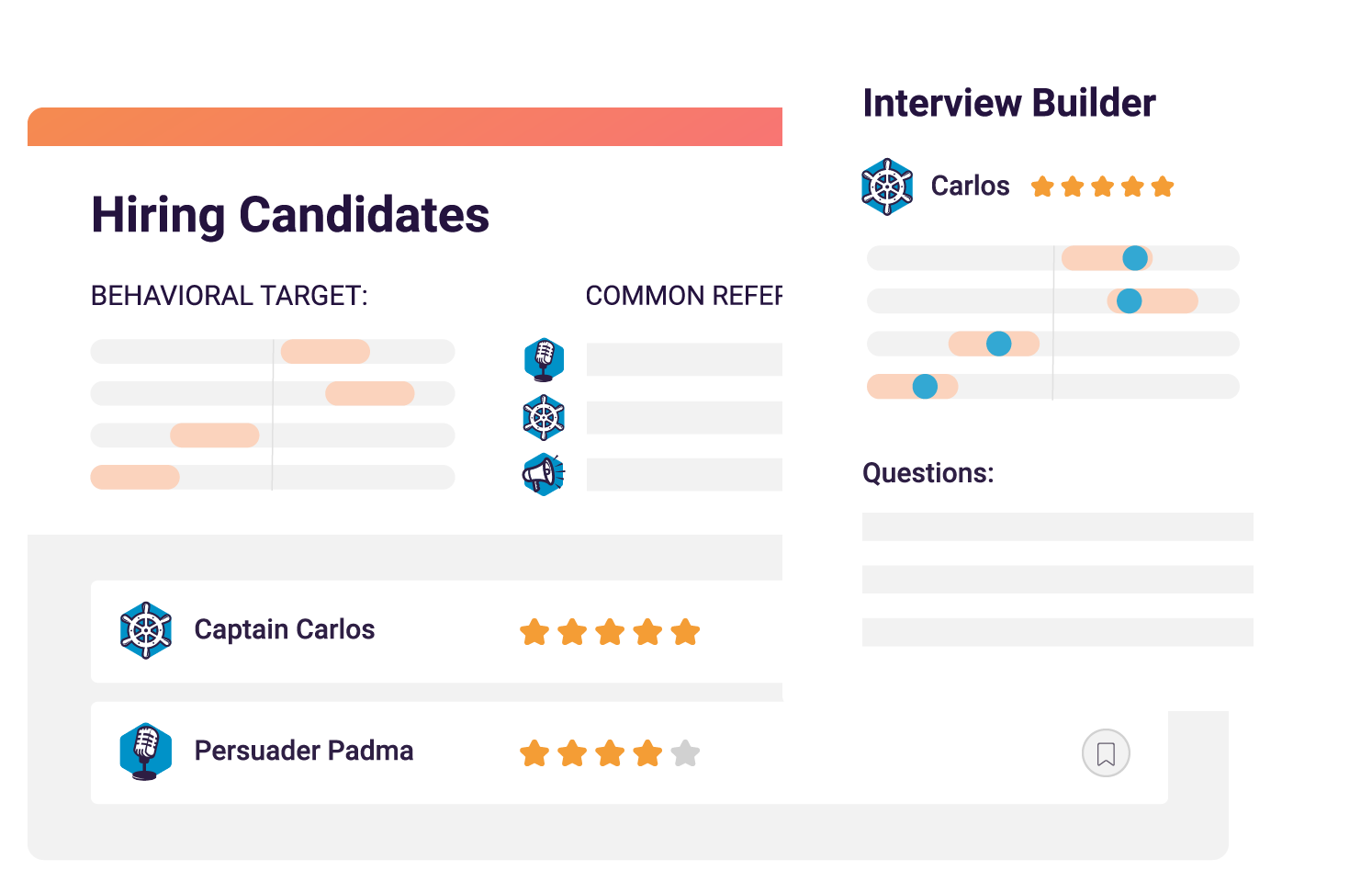Last month, The Predictive Index® SVP of Science, Dr. Greg Barnett, was featured in a Boston Globe article titled “Should you be friends with your boss?” The article posed that very question to several leaders within the Boston area.
Responses were mixed. Some considered friendships key to workplace happiness. Others were more skeptical, citing the dangers of blurring the boundaries between manager and report.
Dr. Barnett shared the following thoughts: “When you’re too close to someone it’s very difficult to have the tough conversations that need to be had. You might be looking out for their feelings when what they need to hear is direct feedback and maybe some tough love.”
Barnett’s comments make sense—especially within the context of PI. Here, everyone wears their behavioral pattern on their sleeve (or, rather, posts it on their desk). While this leads to better interactions and tighter relationships—even between managers and their direct reports—it also encourages greater self-awareness and accountability. This promotes honesty within the organization, allowing for healthy conflict and genuine growth.
Inspired by the Globe’s piece and Dr. Barnett’s contribution, we reached out to other PI employees to get their opinion on the subject. Here’s what they had to say:
Will Otto, Talent Design Manager
Bosses can be friends, but they don’t have to be—and many great managers will choose being a mentor over being a friend. But the best people managers understand what makes you tick, know what you care about at and outside of work, and push you to be your absolute best self. Like a long-time close friend who’s willing to call you on your BS, your manager’s job is to make you successful. They should be rooting for you when things are hard—and pushing you to never make things too easy. So maybe the best way to think of it is that you should be very friendly and care about one another personally, but not quite be “friends.” It’s a complex relationship!

Steve Messina, Brand Manager
My personal working style depends somewhat on personal connection with others—including my boss. Luckily, my manager is on the same page, and we keep a more informal and casual relationship. Being as experienced as she is with branding, she knows exactly how to remain casual and friendly while still maintaining strong leadership aura and reputation—it’s an art. We have the ability to switch from friendly conversation to serious business issues immediately; it’s a relationship we’ve built over time.
Mark Reinke, Customer Success Manager
As a manager, I welcomed many of my reports into my home for family dinners. I have been to their wedding parties, watched them add family members, and maintained close relationships—even to this day.
As friendly as we’d been, I always thought of our relationship differently than friendship. Sometimes I got to be a friend, but being an effective manager also comes with the burden of difficult conversations. I always tried to be “friendly” with my reports—but not at the cost of holding them accountable to their responsibilities at work.

Shannon Howard, Content Editor & Producer
I’m definitely in the camp that you can be friends with your manager. When I was a manager, I was friends with my employees (I actually officiated a wedding for one of them last year). We had the most productive team in the organization—and I believe that’s the result of loyalty cultivated through close relationships.
One of the reasons cited for not being friends with your employees is that you won’t give them feedback. Personally, I believe friends tell each other the truth—even when it’s hard. As a direct report, I’m friends with my current manager. I’ve gone to her house for dinner and met her family. But she didn’t hesitate to tell me that—and I quote—one of my projects was “not your best work,” so we talked about what went wrong and how to do better next time. Our friendship allowed me to know that feedback was given out of a place of caring—not trying to sabotage my career or make me feel badly about myself.
Sharon DiOrio, Software Engineer
I’m an engineer, so the answer is always, “It depends.” A friendly and empathetic relationship between bosses and direct reports can—and should—be beneficial and enjoyable for both parties. It’s also normal and expected that friendships will happen at work between people who enjoy working together. Sometimes this extends to socializing outside of work situations, and deepens beyond normal co-worker friendships.
This is where it can get sticky. I believe that being too close to someone at work limits your ability to remain objective about work and other co-workers. In any case, healthy boundaries allow bosses and subordinates to remain clear about work goals, treat all co-workers fairly, stay engaged and productive at work, and minimize any potential drama.

Patrick Rivers, Customer Service Manager
This is a tricky one! To me, being friends with someone implies an intimate knowledge of that individual on a personal level. At work, while you need to know your people on a human level, I don’t think it rises to the level of true friendship. You want to be friendly, of course—and interested in them as fellow humans—but, as a manager, you need to draw a line for a few reasons:
One, you have to give your team space! Hang out with them at a company outing, but then break away and let them breathe and speak a bit more freely with each other.
Second, you can’t put yourself in a position where your friendship gets in the way of team business. If you promote your friend—or give them a plum assignment—others will scrutinize that decision, and trust will be eroded.
Victoria Nichol, Director, Customer Success
I’ve noticed something interesting as I reflect on my career: Of my last three former bosses, I’m now friends with all three. Not only that—I’ve been to their weddings and witnessed the births of their children. If you like your boss, it’s almost impossible not to be close.
But there’s an important line between friendliness and friendship—especially at work. You can get close to that line, but you don’t want to cross it. You could know details about your boss—such as their kids’ names or what they did this weekend. But you shouldn’t be close enough that you regularly see those kids or participate in those weekend excursions.
Once you cross that line, whether consciously or subconsciously, you limit your boss’s ability to provide radical candor—as well as your own.
Jim Speredelozzi, VP, Sales
In his book “The Like Switch,” Dr. Jack Schafer states that friendships develop based on proximity, frequency, duration, and intensity of interactions. At work, most—if not all—of these factors are present, so it’s normal to see friendships form.
If work friendships are inevitable, then the question becomes this: What’s the best way to manage in light of them?
A good manager asks questions, listens intently, sets clear expectations, gives frequent and specific praise, and is unafraid of hard conversations. Often, it’s that fear of not being able to have tough conversations that causes concern about being friends with employees. One sales VP I worked with never socialized with his sales team. When I asked him why, he told me point blank, “Because I may have to fire them someday.”
The best way to solve this conundrum? Set clear expectations, write them down, and repeat them often. When you catch someone behaving counter to your expectations, tell them—and remind them of those expectations. Remind them why the expectations are there and why they’re important. Also remind the employee that you value them.
Follow this pattern and you can manage people better—friends or not.
Manager-employee friendship remains an important discussion point in today’s climate. But regardless of where you stand, one thing is clear: The key to productivity is self-awareness.
If you’re a manager, setting clear expectations and understanding employee needs is paramount to a successful working relationship. If you’re a direct report, understanding those expectations and knowing your own strengths and weaknesses is equally important. Only by having transparency at both levels can you unlock the true potential of your workplace.
Join 10,000 companies solving the most complex people problems with PI.
Hire the right people, inspire their best work, design dream teams, and sustain engagement for the long haul.








